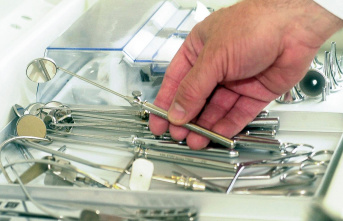The days are getting shorter, the temperatures are dropping and the cold season is in full swing. When the windy and rainy fall weather meets heated indoor spaces, many people suffer from a dry and irritated nose. Fortunately, there is a wide range of tools on the market.
Consumers will find a wide range of seawater nasal sprays and drops online, in drugstores and pharmacies. But which remedy really helps? Stiftung Warentest also asked itself this question – and tested a total of 30 nasal sprays with salt content. The result ranges from suitable to not very suitable.
Isotone salt solutions without additives came off best – i.e. products that only contain water and salt. A total of twelve nasal sprays are therefore rated "suitable". According to the test verdict, they are all suitable for moistening and cleaning the nose in heated rooms and when you have a cold. The price-performance winner is the "dm Mivolis seawater nasal spray", which is available for 1.15 euros per 200 milliliters.
Among the test winners are well-known products such as the "Abtei Seawater Nasal Spray" and the "Tetesept Seawater Nasal Spray". According to Stiftung Warentest, discounter products such as the "Medicazin Seawater Nasal Spray" from Netto or the "Silavit Seawater Nasal Spray" from Müller's own brand are also unreservedly recommended.
There are deductions primarily for the salt content in the nasal preparation. In general, hypertonic nasal sprays perform worse than isotonic nasal sprays. The reason: the salt content of hypertonic solutions is higher than our body's own. As a result, we produce more moisture when using appropriate products. This reduces the swelling of our nasal mucosa - a good but often only short-term effect.
Isotonic solutions, on the other hand, have a salt content that corresponds to that of our own body. As a result, they do not have a decongestant effect, but ensure that our nasal mucosa remains moisturized and cared for in the long term. According to Stiftung Warentest, no additives are required for this. On the contrary: Nasal preparations with essential oils perform the worst.
This is the verdict on products such as "Seawater Nasal Spray with Eucalyptus" from Otriven or the "Nose Clear" spray from Abtei: "not suitable". According to the product testers, this is due to the fact that the effect has not been proven - but the additives increase the risk of an allergic reaction.
If you still don't want to do without the "extra kick" in the nasal spray, you can try aloe vera or dexpanthenol. There are some products with these additives that are found in the good midfield of the product test. But again, there is no evidence that the additives really add value.
You can read the entire review here (for a fee).
Source: Stiftung Warentest












